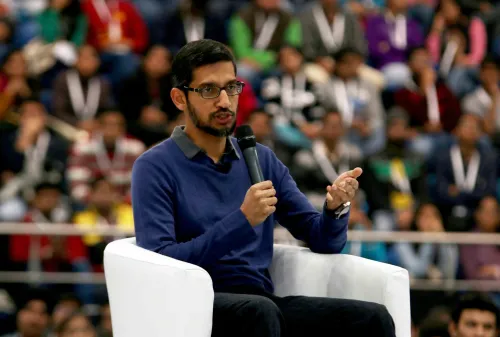Will AI Drive 20% of India's IT and Tech Revenue by 2030?

Synopsis
Key Takeaways
- AI is projected to drive 20% of India's IT revenue by 2030.
- Productivity improvements of 45-50% are expected.
- Shift from T&M to OBP pricing models is underway.
- Three clusters will lead M&A activities.
- GCCs projected to exceed $100 billion by FY2030.
New Delhi, Nov 20 (NationPress) Artificial Intelligence (AI) is anticipated to emerge as the primary catalyst for growth in India’s IT services and software export sector, with projections indicating that AI-driven initiatives could contribute as much as 20% of the industry's revenue by the year 2030, according to a recent report.
The analysis from investment bank Equirus Capital highlights that AI is revolutionizing delivery frameworks and enhancing productivity by 45-50% for Indian tech enterprises.
“The integration of AI within Indian tech companies is facilitating a transition from traditional Time and Material (T&M) pricing models to Outcome-based pricing (OBP). Particularly, Agentic AI is taking charge of functions such as testing, coding, and maintenance, resulting in significant productivity improvements,” stated Sandeep Gogia, Managing Director and Sector Lead – Tech and Digital at Equirus Capital.
This remarkable boost in productivity is compelling Indian IT firms to enhance their AI capabilities across various areas including delivery, platforms, and talent development.
The report mentions that three key clusters are expected to spearhead the next wave of mergers and acquisitions (M&A): AI-enabled delivery, AI-enhanced platforms, and AI skill development.
Tech service providers will increasingly seek to acquire businesses with proprietary intellectual property, automation frameworks, and AI-centric delivery models. Enterprise software platforms that incorporate AI early in their product design are anticipated to experience significantly enhanced revenue growth and attract robust investor interest, according to Equirus.
“We predict that GCCs will exceed $100 billion by FY2030 as organizations shift high-value tasks from outsourcing to in-house centers, supported by favorable policies, growth into tier 2 and 3 cities, and leveraging India’s vast talent pool,” the report noted.
The adoption of AI is crucial for improving unit economics, with prominent Indian companies witnessing 200–400 bps margin expansion due to the automation of operations driven by AI.
Digital companies that are profitable are already experiencing a 15–20% re-evaluation of their valuations by CY25, as highlighted by the firm.









